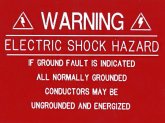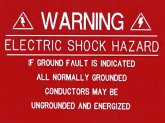I know what grounding a PV array means and how it works.
What I'm not sure is what you meant. But I'll try an answer anyway: if the fault is before the opened breaker then unless there's a fuse/breaker it'll not be interrupted. If the fault is after the opened breaker then no current can flow since the breaker is open. BTW I'm talking as if you opened the breaker manually to do some maintenance on the SCC for example.
Yep, for the others: you need to select and copy the link, and remove [ URL ] from the link to correct it.
What I'm not sure is what you meant. But I'll try an answer anyway: if the fault is before the opened breaker then unless there's a fuse/breaker it'll not be interrupted. If the fault is after the opened breaker then no current can flow since the breaker is open. BTW I'm talking as if you opened the breaker manually to do some maintenance on the SCC for example.
Going to have to make the best of the links too......
Yep, for the others: you need to select and copy the link, and remove [ URL ] from the link to correct it.




